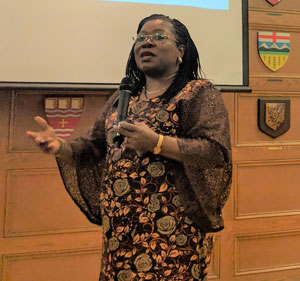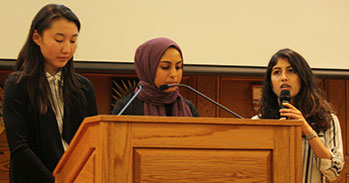Western Heads East in the News
Notice
After careful review of the program and its alignment with Western’s strategic goals and priorities, Western International has made the difficult decision to retire the Western Heads East program. See full notice.
Africa-Western Collaborations Day 2018
With delicious food, informative posters from a variety of disciplines, an excited crowd, and thought-provoking speakers, Africa-Western Collaborations Day 2018 was a huge success!
 On November 15, 2018, the event attracted over 100 people from across campus and the London community to engage in the spirit of partnership across continents. Western had the privilege of hosting the exceptional Dr. Lola Dare as the keynote speaker. Dr. Dare is the President and Chief Executive of the Centre for Health Sciences Training, Research and Development (CHESTRAD), a global non-state, not-for-profit social enterprise established with offices in Nigeria, United Kingdom, and USA.
On November 15, 2018, the event attracted over 100 people from across campus and the London community to engage in the spirit of partnership across continents. Western had the privilege of hosting the exceptional Dr. Lola Dare as the keynote speaker. Dr. Dare is the President and Chief Executive of the Centre for Health Sciences Training, Research and Development (CHESTRAD), a global non-state, not-for-profit social enterprise established with offices in Nigeria, United Kingdom, and USA.
Dr. Lola Dare’s keynote address, Through Their Eyes: Complex Issues, Disruptive Solutions for Trafficking in Persons and Forced Migration in Africa, enlightened the audience and provided powerful stories of the consequences derived from such issues. Particularly powerful, real-life stories of forced migration and its consequences. Particularly powerful in discussing forced migration, was Dr. Dare's point that strategies for survival become treated as criminal when crossing a border. She highlighted how this does not feel supportive or helpful for the migrant seeking a better life as they are then forced to return to human trafficking situations to survive.
Dr. Nicole Haggerty, Director of The Africa Institute, provided an update of The Africa Institute's work over the past few years, and the direction that it is heading. In the past year, The Africa Institute has had several notable accomplishments, including submitting funding proposals for $8 million within the last six months. Dr. Haggerty identified the overarching goal for The Africa Institute is to have global recognition as a world-class institute that:
- Has mastered collaborative, transdisciplinary research
- Cultivates strong, equitable African-Canadian partnerships between faculty, students, and institutions
- Serves as an incubator and accelerator of innovations on issues dealing with African societies
With a new strategy evolving and plans to continue driving for collaborative grants, promote more last mile opportunities across more disciplines, and to mobilize knowledge in a variety of ways, The Africa Institute has exciting plans for 2019 with a strategic agenda.
The event also featured three student "Pecha Kucha"-style presentations:
 Katherine Yu, Megha Shetty, and Anisah Hooda discussed their Western Heads East Internship experience in Tanzania. Working with a women’s empowerment NGO, Mikono Yetu, Katherine, Megha and Anisah shared their experience working with Tanzanian Fiti Probiotic Yogurt Producers, largely women and youth groups, across the Mwanza region. Traditionally, the Western Heads East program has been based in probiotic yogurt social enterprises but new research on other probiotic foods is being done and the students’ internship focused on training Fiti probiotic yogurt producers on how to make new probiotic products, such as probiotic pineapple juice. Katherine, Megha and Anisah described the positive uptake from local women in Tanzania for a new healthy product to incorporate in their social enterprises.
Katherine Yu, Megha Shetty, and Anisah Hooda discussed their Western Heads East Internship experience in Tanzania. Working with a women’s empowerment NGO, Mikono Yetu, Katherine, Megha and Anisah shared their experience working with Tanzanian Fiti Probiotic Yogurt Producers, largely women and youth groups, across the Mwanza region. Traditionally, the Western Heads East program has been based in probiotic yogurt social enterprises but new research on other probiotic foods is being done and the students’ internship focused on training Fiti probiotic yogurt producers on how to make new probiotic products, such as probiotic pineapple juice. Katherine, Megha and Anisah described the positive uptake from local women in Tanzania for a new healthy product to incorporate in their social enterprises.
Yvonne Kasine spoke on the Training, Support, Access Model (TSAM) Project in Rwanda, showcasing the current goals of the TSAM project and her own study related to the project. The TSAM project at Western aims to contribute to the improvement of maternal, neonatal, and child health outcomes and for a reduction of maternal, neonatal, and child mortality in Rwanda. Yvonne highlighted goals around mentorship as central to the project, particularly interdisciplinary teams of Rwandan and Canadian experts. Yvonne also described her own study related to the project, which will explore nurses’ and midwives’ experiences of participating as mentees in the TSAM clinical mentorship program in Rwanda.
Romaisa Pervez shared about the Community REcovery Achieved Through Entrepreneurism (CREATE) Kenya strategy. The strategy was developed to address the need for cost-effective, innovative interventions for persons with serious mental illness. Romaisa highlighted the Psychosocial Rehabilitation (PSR) Toolkit, and its purpose to build skills for recovery and rehabilitation practice and tools. Looking ahead, focus groups are in progress to develop a more sustainable model of the PSR Toolkit. The plan is to gather information from the focus groups and present the information to local stakeholders to co-create a more sustainable model that can become scalable across Kenya and in other similar contexts.
Western Heads East and The Africa Institute would like to thank everyone who participated and contributed to making the day special. We extend a special thank you to our supporters:
- The Africa Institute
- Western International
- Western Heads East
- Global Health Systems program
- Faculty of Engineering
- Faculty of Science
- Ivey Business School

